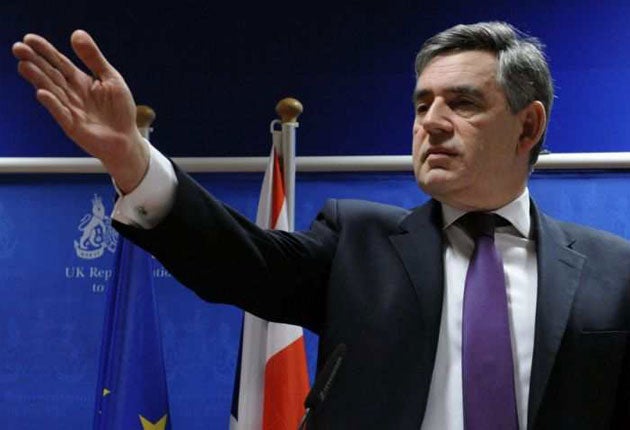Anglo-German rift deepens as UK envoy issues formal protest
Row over Finance Minister's attack overshadows EU summit / Leaders agree £175bn boost to stimulate European economy

Britain has formally protested to the German government about the stinging attack on Gordon Brown by its Finance Minister, deepening the Anglo-German dispute over the Prime Minister's economic strategy.
Sir Michael Arthur, the British ambassador in Berlin, raised strong objections with the German Finance Ministry over the remarks by Peer Steinbrück, who branded Mr Brown's £20bn fiscal stimulus "crass" and "breathtaking".
David Miliband, the Foreign Secretary, denied knowledge of the complaint. But the British embassy in Berlin confirmed that Mr Steinbrück's criticism was raised by Sir Michael, a clear sign that the Brown Government was rattled by the attack. A spokesman said the ambassador had made it clear that, "we fundamentally disagreed with the comments made by Peer Steinbrück".
Yesterday, the pound fell to a record low against the euro for the fifth day running, dropping to €1.1191 amid fears that the British economy would be among the hardest hit by the recession. It later edged to €1.12.
Mr Brown tried to move on from the row with the Germans, telling his critics their "answer" was yesterday's approval of a £175bn European-wide stimulus by EU leaders at their summit in Brussels. It was agreed by all 27 member states, including Germany, whose Chancellor, Angela Merkel, backed the need to stimulate the continent's economies.
Accusing the Tory Opposition, which has exploited his row with German politicians, of having a "do-nothing approach", Mr Brown said: "European governments have come together. This sets aside the opinion the Conservative Party has that nothing could be done and that the recession should take its course. We have a responsibility to our peoples to give real help to families and businesses now."
He blamed Mr Steinbrück's attack on "domestic politics" in Germany, a reference to divisions in Ms Merkel's left-right coalition over whether to adopt a bigger fiscal package. However, two German politicians questioned the British Government's strategy yesterday. Steffen Kampeter, a budget spokesman for Ms Merkel's Christian Democrats, said Mr Brown was seeking Berlin's help only now that the British boom was over. "The British are expecting that we help them out of the muck. But we certainly weren't expecting that they share their profits from the financial market boom with us." Carsten Schneider, a Social Democratic Party MP, criticised the Government's £12bn temporary cut in VAT as a waste of money. "The British and Brown were good when it came to bailing out the banks," he said. "But I think the sales tax cut is counter-productive."
Mr Brown argued that the "ambitious" EU package was "good news for the UK and good news for Europe" as it would boost growth and jobs throughout the continent.
The package, worth 1.5 per cent of EU output, envisages tax cuts, a reduction in regulation, support for small business and further interest rate cuts. But individual nations will be able to opt out of measures with which they disagree, such as tax cuts. Some countries, including Britain, have already announced such measures and British sources suggested the Government would not go any further than last month's pre-Budget report.
George Osborne, the shadow Chancellor, said: "Gordon Brown's claims that the rest of the world backs his reckless borrowing are in tatters."
He claimed there was "a growing international consensus" that Mr Brown's "borrowing binge" will make the recession worse, the recovery more difficult and burden future generations with a mountain of debt. Mr Brown tried to head off another row with the Tories over the Lisbon Treaty to streamline EU decision-making. He insisted that concessions offered to the Irish government in the hope it will win a second referendum next autumn would not affect the treaty passed by the UK Parliament. Any reopening of the treaty would have provoked Tory calls for the blueprint to be ratified again and renewed demands for a British referendum.
The Tories have promised not to "let the matter rest" if they win the next election but refuse to say what they would do if the treaty has been approved by all 27 EU states by then.
EU summit: Stimulus package
*The recovery plan calls for £175bn – or 1.5 per cent of the EU's GDP – to be spent on softening the impact of the recession. Individual states can still act according to "national circumstances", but possible measures include "judicious reductions in tax burdens" and "a reduction in social security contributions". The European Investment Bank will provide £26.25bn in the current financial year for small and medium-sized firms, renewable energy and clean transport. The EU will also consider allowing member states to cut VAT on "labour-intensive services" below the EU minimum rate of 15 per cent to boost jobs.
Subscribe to Independent Premium to bookmark this article
Want to bookmark your favourite articles and stories to read or reference later? Start your Independent Premium subscription today.

Join our commenting forum
Join thought-provoking conversations, follow other Independent readers and see their replies